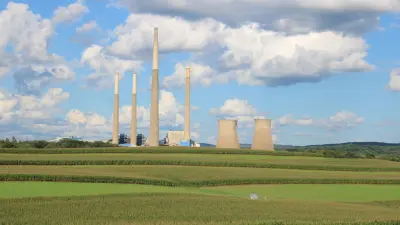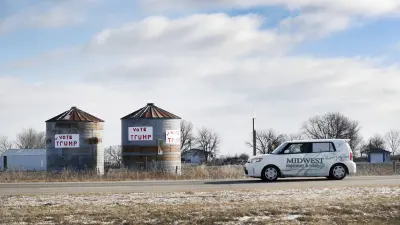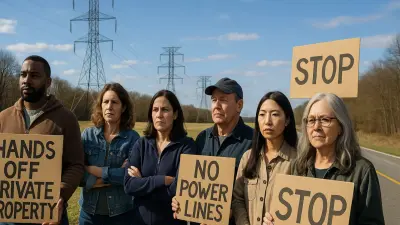A score of energy, tech and capital investment companies announced their commitments nearly a week ago to more than $93 billion worth of projects to prepare Pennsylvania for a role in the artificial intelligence revolution that proponents say will transform the world’s economy.

The projects range from plans to build a fleet of new nuclear reactors across the country to workforce development programs to train the next generation of tradespeople and technicians to build and operate new power plants and data centers.
Announced to coincide with GOP U.S. Sen. Dave McCormick’s Pennsylvania Energy and Innovation Summit in Pittsburgh last Tuesday, the investments were cast as crucial to winning a race against China to dominate in AI.
And with President Donald Trump headlining the event at Carnegie Mellon University,, the panelists largely reflected Trump’s “Drill, baby, drill,” fossil fuel-forward energy policy.
With the exception of nuclear power, Trump disparaged renewable energy during his remarks in a roundtable discussion on AI and feeding its demand for electricity. Trump signed a budget reconciliation bill this month that cancels tax credits for wind and solar energy projects, which observers say will slow their entry into the market.
“You can own your own electric plants, and they’ll be powered by maybe nuclear, maybe gas, maybe coal. You know, we brought coal back in,” Trump said. “They won’t be powered by wind, because it doesn’t work. I hate to say it just doesn’t work. It’s rather intermittent.”
In fact, wind energy is becoming a key source of electricity, according to the World Economic Forum, which cited a record 117 gigawatts of new capacity installed globally in 2023. A gigawatt is enough electricity to power about 750,000 homes.
Environmental advocates protested the summit, with hundreds of people flooding the streets around CMU. They condemned plans to power AI using fossil fuels, warning that it would increase carbon emissions that cause climate change and, despite claims to the contrary, make electricity more expensive for consumers.
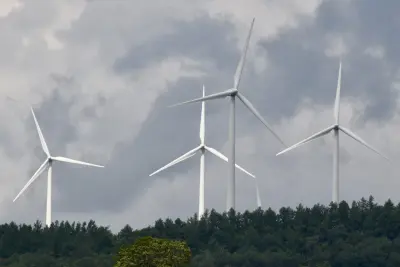
Wind turbines at the Stoney Creek Wind Farm in Somerset County, Pa. (Peter Hall/Capital-Star)
Democratic Gov. Josh Shapiro also drew criticism for his participation in the summit.
“This is exactly the wrong direction on energy at this critical time. Pennsylvania has a chance to pivot right now and lead on the renewable energy transition that we need to fight the climate crisis. This meeting is just about planning more fracking projects and asking Pennsylvanians to sacrifice our health and the environment yet again.” Sandy Field, chair of the Climate Reality Project: Susquehanna Valley PA chapter, said in a statement.
Shapiro told reporters that he also questions the Trump administration’s opposition to clean energy projects. “I think that reconciliation bills is bad from Pennsylvania,” he said. “It’s somewhat ironic that we’re here talking about energy jobs and the bill that the president presumably will be touting would gut 26,000 energy jobs. I think it’s a bad deal.”
Eric Epstein, chair of TMI-Alert questioned whether many of the projects will happen. His group is opposed to restarting the former Three Mile Island nuclear plant in Dauphin County to power an artificial intelligence data center.
“Most of the proposed projects are in the planning or fantasy stages, and depend on private equity, investment from outside of the state and federal government subsidies,” he told the Capital-Star, adding that political and financial factors could affect their viability.
So, what’s in the $93.5 billion investment that McCormick touted at his summit? The Capital-Star broke down the list.
- Six natural gas projects totaling $24.2 billion that range from new electricity generating capacity, such as Frontier Group’s plan to convert the former Bruce Mansfield coal-fired power plant in Beaver County to a 3.6 gigawatt natural gas-fired plant, to gas driller Equinor’s plan to increase natural gas production. Two of the projects on the list include the price of natural gas that will be purchased to fuel existing or upgraded power plants, including an agreement in principle to buy $15 billion worth of gas.
- Two projects involve nuclear energy. Constellation Energy said it will spend $2.4 billion to increase the output of its existing nuclear power plant near Limerick, Montgomery County. That’s in addition to Constellation’s announcement earlier this year of a $1.6 billion deal with Microsoft to restart the former Three Mile Island power plant, renamed the Crane Clean Energy Center. It’s also applying to renew its license for the Peach Bottom Clean Energy Center in York County to continue operating those reactors until 2054. Westinghouse Electric Co. said it will build 10 new nuclear plants in the United States, which will generate an estimated $6 billion in economic activity and create 15,000 new jobs in southwest Pennsylvania.
- Hydroelectric power is the sole source of renewable energy among the projects announced.. Brookfield Asset Management said it has a $3 billion 20-year deal with Google to purchase electricity from the Safe Harbor and Holtwood hydroelectric dams on the Susquehanna River. Brookfield said it will relicense and overhaul dams, which were built in the early 20th century, to produce 3 gigawatts of electricity.
- Two of the commonwealth’s major electric distribution companies, PPL Corp. and First Energy, said they will expand their grid capacities to support the demand from data centers. First Energy said it will spend $15 billion on infrastructure improvements in 57 counties. PPL said it will spend $6.8 billion on grid improvements and a joint venture with investment manager Blackrock Inc. to build a gas fired power plant near Marcellus shale gas supplies.
- Three tech firms said they will invest in workforce development projects. AI product developer Anthropic will inject $2 million towards programs at Carnegie Mellon University to support advancing AI-powered energy solutions and building the cybersecurity workforce needed to protect America’s energy infrastructure. Social media company Meta will make a $2.5 million gift to support early-stage Carnegie Mellon University-affiliated startups, including those in the energy, infrastructure, health care and defense industries. Google said it has launched a new “AI Works for PA” initiative offering free training for one million Pennsylvania small businesses and Pittsburgh residents. The tech giant also provided a grant to the International Brotherhood of Electrical Workers and National Electrical Contractors Association electrical training program.
Data centers, like ones that Amazon Web Services announced in May it will build in Luzerne County and in Bucks County, are warehouse-like buildings containing vast numbers of computers to perform the processing that AI applications such as Chat GPT need. The AWS center planned adjacent to the Susquehanna Steam Electric Station in Salem Township could add about 1.2 gigawatts of demand to the commonwealth’s electricity grid.
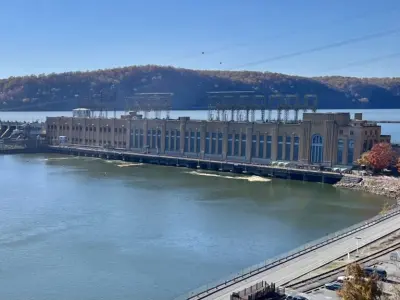
The Safe Harbor Dam on the Susquehanna River is one of two hydroelectric facilities being refurbished in a $3 billion deal between Brookfield Asset Management and Google. (Peter Hall/Capital-Star)
PJM Interconnection, the organization that operates the electricity grid for Pennsylvania and 12 other states, has predicted its peak demand will grow by about 70 gigawatts to 220 gigawatts by 2040. The growth is being driven not only by AI, but also the increased electrification of transportation and industry.
Recognizing that Pennsylvania is facing a power crunch in coming years, Shapiro has proposed a plan to ensure the commonwealth remains competitive in the energy market. It would leverage the state’s natural gas resources while making it an attractive location for sustainable energy technologies. Part of the plan, now under consideration as a suite of bills before the General Assembly, is a goal to obtain 35% of the state’s energy from renewable sources by 2035.
Another element of Shapiro’s Lightning Plan is a state board dedicated to streamlining the permitting process for new energy projects.
State Rep. Greg Vitali, who chairs the House Environmental and Natural Resource Protection Committee said those and other renewable energy initiatives, including a bill to allow shared community solar developments, have not passed yet.
“We are certainly not doing what we should be doing as a state as far as expanding renewables,” Vitali said, adding that the loss of tax credits would make it harder. “I’m not expecting much help from the federal government at all.”
After speaking last Tuesday on a panel with McCormick and AWS CEO Matt Garman, Shapiro expressed cautious optimism about the projects announced during the summit.
“Obviously, there’s a difference between what someone says in a press release today and when shovels go in the ground in the future,” he said. “I want to see all of these dollars come to Pennsylvania, and we’re going to be working closely with the companies that want to plant a flag here, to allow them to get their shovels in the ground and scale up and create jobs.”

